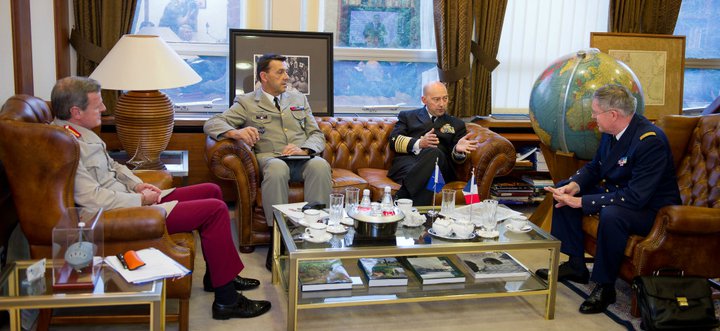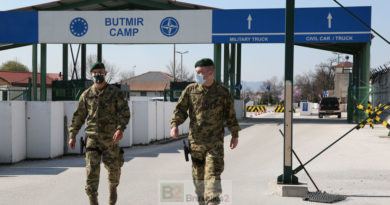The Brussels declaration (Fr-All-Be-Lux), 29 April 2003. The text
MEETING OF HEADS OF STATE AND GOVERNMENT OF GERMANY, FRANCE, LUXEMBOURG AND BELGIUM ON EUROPEAN DEFENSE
(known as the "Pralines" summit)
JOINT DECLARATION
(Brussels, 29 April 2003)
With enlargement and the elaboration of a Constitutional Treaty, the European Union will tomorrow be stronger, but also more diverse. Our common conviction is that Europe must be able to speak with one voice and fully play its role on the international scene. To this end, we believe that it is necessary to give new impetus to the construction of the Europe of Security and Defence. Indeed, the European Union must have a credible security and defense policy. Because diplomatic action is only credible - and therefore effective - if it can also rely on real civilian and military capabilities.
Europe shares with America, with which it has faced security challenges for more than half a century, values and ideals which are the fruit of its history. The transatlantic partnership remains a fundamental strategic priority for Europe. This partnership is a necessary condition for security and world peace. Following on from the Washington Summit Declaration, we wish to continue adapting the Atlantic Alliance, which remains the foundation of the collective security of its members, to the challenges of the 21st century. We are determined to implement the decisions of the Prague Summit, because we understand our commitments in the Atlantic Alliance and in the European Union as complementary. The strategic partnership between the European Union and NATO, which is based on the declarations of the Berlin and Washington Summits, has already enabled the European Union to use NATO resources to conduct its first operation in the Former Yugoslav Republic of Macedonia. We hope that tomorrow the arrangements put in place between the two organizations will enable the European Union to take over from NATO in Bosnia and Herzegovina.
It is in this spirit that, following on from the Saint-Malo Summit and the Cologne European Council, the European Security and Defense Policy has gradually developed since the Helsinki European Council in December 1999.
We believe that the time has come to take a new step in the construction of the Europe of Security and Defence, based on reinforced European military capabilities which will also contribute to giving the Atlantic Alliance new vitality and will open the way to a renewed transatlantic relationship.
*
To give new impetus to the European Security and Defense Policy, we propose that the Convention on the future of the European Union and the Intergovernmental Conference endorse the following principles and incorporate them into the Constitutional Treaty:
- the possibility of conducting enhanced defense cooperation;
- a general solidarity and common security clause binding all the Member States of the European Union and making it possible to deal with risks of any kind towards the European Union;
- the possibility for Member States which so wish to subscribe to additional obligations, within the framework of enhanced cooperation and without this entailing obligations for third parties;
- the reformulation of the Petersberg tasks, allowing the European Union to use civil and military means in order to prevent conflicts, to manage crises, including the most demanding missions;
- the creation of a European Agency for the development and acquisition of military capabilities with the aim of increasing European military capabilities and strengthening interoperability and cooperation between the armed forces of the Member States. This Agency will contribute to the creation of an environment favorable to a competitive European defense industry;
- the creation of a European Security and Defense College, in order to promote the development and dissemination of a European security culture.
We further propose that the Convention adopt the concept of the European Security and Defense Union (ESDU). As a contribution to the reflection that we wish to pursue with the States concerned, we believe that the UESD should have the vocation of bringing together the Member States which are ready to go more quickly and further in strengthening their cooperation in the field of defense. In particular, States participating in the UESD:
- will undertake to provide help and assistance in the face of risks of any kind;
- systematically seek the harmonization of their positions on security and defense issues;
- coordinate their defense efforts;
- develop their military capabilities;
- will increase their efforts in the area of security and defence, more particularly with regard to investments in military equipment.
- Participation in UESD will involve:
- participation in major European equipment programs, such as the A400M;
- strengthening the effectiveness of European military capabilities, by resorting, to the greatest extent possible, to specialization and the pooling of means and capabilities;
- strengthening the pooling of resources in terms of officer training, exercises, engagement and logistics;
- readiness to contribute to peacekeeping operations under the aegis of the United Nations.
The ESDU would be open to all current and future member states willing to join its framework. We would like this concrete cooperation to be incorporated into the Constitutional Treaty of the European Union, so that in the long term, all current and future Member States can be part of it.
*
In the military field, we have decided, as far as we are concerned, to implement, as of now and in the spirit of the declarations of Saint-Malo and Cologne, a certain number of concrete initiatives intended to promote closer of our national defense tools. These projects aim to avoid unnecessary duplication between national armies and thus to strengthen the effectiveness of European defense means. They are open to all interested current and future Member States.
These following initiatives fall within the perspective of our joint participation in operations conducted within the framework of the European Union or NATO:
the development of a European rapid reaction capability. Progress in this area will contribute to achieving the objectives of the European Union, to strengthening the European contribution to the development of the NATO Response Force and to ensuring their interoperability. In order to improve the European rapid response capability, we will create a starting capability around the Franco-German brigade in which Belgian commando elements and Luxembourg reconnaissance elements will be integrated. This European rapid reaction capability may be reinforced by troops from other interested States and will be available for European operations, NATO operations and operations conducted by the European Union under the aegis of the United Nations.
the creation, by June 2004 at the latest, of a European strategic air transport command, available for European and NATO operations. The A400M program is of crucial importance for the development of such a European strategic airlift capability. In the longer term, we plan to create, with the States participating in this programme, a common strategic air transport unit and to subordinate this unit to the European strategic air transport command. In addition, we will study with the States concerned the creation of a common command for strategic transport (air, sea and land).
The creation of a joint European NBC protection capability with the objective of protecting civilian populations and troops deployed in European operations.
The creation, in conjunction with the Commission and ECHO, of a European system for emergency humanitarian aid in the event of disasters (EU-FAST - "European Union First Aid and Support Team") enabling the European Union to associate civilian and military resources to dispatch initial emergency humanitarian aid within 24 hours. This system will be based on the pooling of existing means and capacities. It will be a collective mechanism for which the countries which so wish will take responsibility in turn;
the creation of European training centers: common tactical training unit for A400M crews; helicopter crew training center; bringing together training courses at sea for naval officers with a view to creating a European fleet-school; reconciliation of training courses for air force pilots by highlighting current initiatives, particularly in the tactical field.
strengthening European capabilities for operational planning and the conduct of operations. The Member States of the European Union decided at the Cologne European Council in June 1999 to carry out crisis management operations using NATO assets and capabilities or independently.
With regard to operations for which NATO assets and capabilities will be used, a permanent arrangement between the European Union and NATO has been put in place. The European operation in the Former Yugoslav Republic of Macedonia is currently taking place under this arrangement, which constitutes one of the pillars of the strategic partnership between the European Union and NATO.
With regard to European Union operations without recourse to NATO assets and capabilities, in line with the various proposals made to the Convention, we believe that it is necessary to improve the operational planning and conduct capabilities of European Union operations while avoiding unnecessary duplication and competition between national capacities.
To this end, we are proposing to our partners the creation of a nucleus of collective capability for planning and conducting operations for the European Union. This core would, for use, be reinforced by national staff. Open to all Member States of the European Union who so wish, it would aim to establish liaison arrangements with its national counterparts. In order to ensure a close link with NATO, he would also be responsible for establishing liaison arrangements with SHAPE, including its possible use to support DSACEUR in its role as prime candidate for the command of European Union-led operations using NATO assets and capabilities.
In this spirit, and until the establishment of such a capacity by the European Union, the States concerned will establish a core of collective capacity which they would place at the disposal of the European Union, instead of national means, for operational planning and the conduct of operations led by the European Union without recourse to NATO means and capabilities. Such a pooling of resources would make it possible to avoid national duplication and would significantly improve interoperability. The decision concerning the creation of such a capacity could be taken by the end of the year with all the countries concerned with a view to its implementation in the summer of 2004 in Tervuren.
With a view to improving the command and control capabilities available to both the European Union and NATO, the four Defense Ministers will take the necessary steps to establish, by 2004 at the latest , a multinational deployable headquarters for joint operations that would be based on existing deployable headquarters.
*
We would like to be able to define with all the States concerned the contours of the European Security and Defense Union, which will contribute to strengthening the European pillar of the Atlantic Alliance, and to implement concrete projects intended to bring our tools closer together national defenses.
In this spirit, we would like these proposals to be the subject of a first exchange of views at the next "Gymnich" with a view to a more detailed presentation of work at the next European Council in Salonika./.


